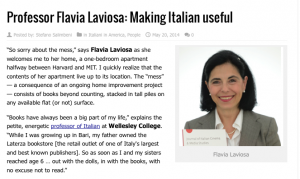 “So sorry about the mess,” says Flavia Laviosa as she welcomes me to her home, a one-bedroom apartment halfway between Harvard and MIT. I quickly realize that the contents of her apartment live up to its location. The “mess” — a consequence of an ongoing home improvement project — consists of books beyond counting, stacked in tall piles on any available flat (or not) surface.
“So sorry about the mess,” says Flavia Laviosa as she welcomes me to her home, a one-bedroom apartment halfway between Harvard and MIT. I quickly realize that the contents of her apartment live up to its location. The “mess” — a consequence of an ongoing home improvement project — consists of books beyond counting, stacked in tall piles on any available flat (or not) surface.
“Books have always been a big part of my life,” explains the petite, energetic professor of Italian at Wellesley College. “While I was growing up in Bari, my father owned the Laterza bookstore [the retail outlet of one of Italy’s largest and best known publishers]. So as soon as I and my sisters reached age 6 … out with the dolls, in with the books, with no excuse not to read.”
Most of her life has been spent in front of an open book, first in college while studying foreign languages and literatures at the university of Bari; then during her travels around Europe to perfect her language skills; then in Buffalo, N.Y., where she earned her master’s degree and Ph.D.; and finally during a quarter century as an educator. After a brief period at Ohio State, that career took her to Wellsley College, a prestigious university located in a wooded and affluent suburb of Boston, where she has been teaching for the past 22 years.
Not only did Laviosa read a whole lot of books, she contributed to writing and editing a few before setting out to tackle her first “solo” one, a treatise-in-the-making titled, “Framed Lives and Screen Deaths: Honor Killings in World Cinema.”
It was the natural outcome of a career devoted to an in-depth observation and analysis of the relationship between women and the movies, both in front of the camera, as subjects, and mostly behind it, as directors. The latter has been the linchpin for the last 14 years of her popular signature course, which runs the gamut of Italian filmmaking by women, from Lina Wertmuller all the way to Cristina Comencini.
“Although not everyone agrees, I do not think there is a big difference between movies directed by women and by men. There are women who perfectly understand the male soul and the other way around,” Laviosa explains. “I believe filmmakers, at least the good ones, completely transcend gender.”
Laviosa, who is the founder and director of the Journal of Italian Cinema and Media Studies, uses her course to link three diverse yet complementary subjects: Italian language and culture, cinema and women’s studies.
Although this interdisciplinary experiment began well before the global economic meltdown in 2008, she considers the approach crucial to surviving the ongoing crisis. “Before the crisis, enrollment in Italian courses was thriving: people would study our language and culture either because they needed it for music, arts or fine dining related careers or just for the pleasure of it,” she recounts. “Today, aspiring museum curators, opera singers, and chefs are still there but many others are not: They simply cannot afford to study something just because they like it. Thus, either we link our beautiful language to something useful – as well as interesting – or the number of students will keep dropping.”
Laviosa’s course certainly isn’t at risk: Interest in Italian cinema has never faded at least in the halls of academe. In fact, the recent Oscar awarded to Paolo Sorrentino’s “La Grande Bellezza” (though Laviosa is admittedly not very fond of it), can only help to keep the land of Fellini, Antonioni, De Sica and others on the radar of educated moviegoers. “Of course, an Oscar is always a good thing to win,” she says with a touch of skepticism. “But I am not convinced that a lot of the recent production coming from Italy is bound for immortality. The fact that we make a lot of movies does not mean we create a lot of art.”
An avid consumer of Italian film even in her spare time, Flavia confesses to being more impressed by our glorious past rather then our uncertain present. When given the hypothetical choice of bringing three movies to a deserted island (provided, of course, there is electricity, a DVD player and a television) she simply says, “Luchino Visconti.” As far as her favorite three books, I dare not ask.
